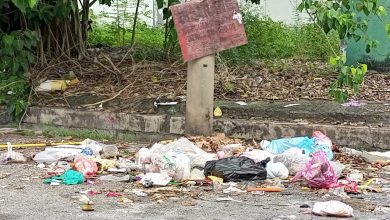Tasty Addition to Taiping Zoo




“My late maternal grandfather was an expert cook. His cooking talents were inherited by my mother. Among my siblings, I was the only one interested in cooking. I observed her every move in the kitchen since I was little,” said Abdul Ghani Noordin, Managing Director of the Mergastua Restaurant.
Mergastua is the latest addition to the Taiping Zoo and Night Safari facility. It took Ghani over two months to transform the old and dilapidated zoo canteen into the top-notch restaurant it is today.


The eatery’s specialties include chicken chop, mee goreng, samosa and nasi goreng kampung. Phase two of the menu will be ready by year’s end. It will be focused on a wide-range of South and South-East Asian dishes, namely from Ho Chi Minh City, Shanghai and from the Indian subcontinent.
As mee udang is synonymous with Taiping it will be added to the list with a distinct Mergastua touch, courtesy of Ghani’s ingenuity. The entrepreneur, who has been in the food and beverage industry for well over three decades, exclaimed that cooking to him is more therapy than passion.
“I travel a lot so whenever I eat, I’ll ask the cooks to share their recipes and cooking tips. That’s how I learn to innovate. However, all my cooking is done based on my mother’s techniques,” he enthused.
“I can still recall the aroma of Kopi Kluang going by the brand name, ‘Cap Televisyen’ which my late grandmother brewed when I was little in Johor. The smell sticks till today. And when I found that the factory is still around, I knew I had to get it for my restaurant.”
Local specialities like lemak cili padi, asam pedas lada hitam and serunding udang kering are also served for the less adventurous. Food served is, however, pork and beef free as the restaurant believes in pleasing and serving everybody.


Due to the 1965 separation, Ghani was born in Singapore while his other family members grew up in Malaysia.
Mergastua Restaurant is open daily from 10am to 9pm, on weekdays and 9am till 10pm, on weekends. As Ghani is always on the move, the restaurant is taken care by Yusoff Ghani, General Manager of Mergastua.
“We feel that a restaurant like this is a must in a zoo. It’d be much more convenient for visitors, local and out-station, to have their meals here rather than venture outside,” said Taiping Municipal Council’s Tourism Education and Outreach Division chief, Puan Hanim Ramly.
Apart from the Mergastua Restaurant, upgrading works are on-going at the enclosures of the marmosets, tamarins, orangutans, chimpanzees, ibexes, sambar deer, tigers, Asian golden cats, gaurs, lowland forest and Australian fauna while a night stall will be built within the African savannah pen.
The upgrades, once completed, will allow visitors to have a better view of the animals and, at the same time, provide some ‘creature comforts’ to the zoo’s precious inhabitants.




Operating a zoo requires strict adherence to the rules and regulations imposed by the Department of Wildlife and National Parks, especially on each enclosure’s size.
Dr Kevin Lazarus, Director of Taiping Zoo and Night Safari, has his own plans behind every upgrading. For instance, he added an exercise yard for the orang utans. Therefore, when the primates have disagreements with one another, which might lead to fights, the extra space allows them to cool off.
“We can’t afford to have trees in the enclosures, as trees tend to deteriorate faster when animals use them too frequently. Instead, we build concrete structures which serve the same purpose as a tree for the chimpanzees,” explained Hanim.




Chimpanzees are afraid of water. Thus, during feeding, if their food falls into the water, they will test the depth of the water first before picking it. There is always a reason behind every action and this is amazing.
When the new enclosures are ready and the animals transferred, the older enclosures will be used to house other animals that do not have specific requirements.


“Putting animals on show is a form of cruelty. Most of us might not think so but such shows are like bribing. I don’t believe in coming to the zoo to watch animals perform antics they don’t normally do in the wild,” said Dr Kevin.
Names of animals on the boards in front of the enclosures are written in five languages, Malay, English, Chinese, Tamil and Arabic. Their scientific names too are also mentioned. At night the boards are lighted up so they are legible. Fun facts are also included to spice things up.
The total cost of the zoo’s upgrading efforts is in the region of RM3 million, with funding coming from the Penang-based Northern Corridor Implementation Authority. Some 90 per cent of the upgrading works have so far been completed.
“Our other aim is to focus on education and conservation. When we’ve a good collection of animal species, we’ll exchange them with other zoos to avoid poaching,” said Hanim.
Khaleeja


